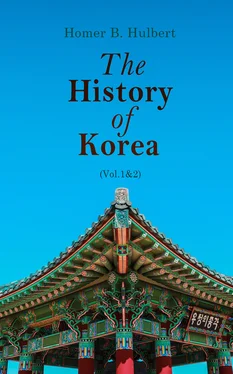In 998 the king died and his nephew, Song, posthumous title Mok-jong, ascended the throne. His first act was to revise the system of taxation, probably by causing a remeasurement of arable land. Officials received their salaries not in money nor in rice, but to each one was assigned a certain tract of land and his salary was the produce from that particular tract. In the third year of his reign, 1000 A.D., he received investiture from the Kitan emperor. His fifth year was signalized by a five days’ eruption of a volcano on the island of Quelpart. This reign was destined to end in disaster. The widow of the late king formed a criminal intimacy with one Kim Ji-yang, whom she raised to a high official position. The whole kingdom was scandalized. She had the walls of her palace decorated with sentiments expressive of the epicurean dictum “Eat, drink and be merry”; and curiously enough expressed the belief that after enjoying all this world had to give they would all become Buddhas in the next. This is probably a fair sample of the Buddhistic teaching of the times, at least this was its legitimate fruit. She and her lover soon began to plot against the young king. The latter was ill at the time but knew well what was going on. He sent for Sun, the illegitimate son of Uk, of whom we spoke in the last chapter, with the intention of nominating him as his successor. At the same time he sent post-haste to the country and summoned Gen. Kang Cho, a faithful and upright man. On his way up to the capital the general was falsely told that it was not the king who had summoned him but the queen dowager’s lover. Enraged at being thus played upon, the stern old general marched into the capital and seized the lecherous traitor and gave him his quietus. He then turned upon the king and put him to death as well. He had not looked carefully into the case, but he deemed that the whole court needed a thorough cleaning out. He completed the work by driving out the queen dowager who deserved the block more than any other; and then he seated the above-mentioned Sun on the throne. His posthumous title is Hyön-jong. This was in 1010 A.D.
Table of Contents
Reforms … eclipses. … Kitan declares war. … Koryŭ on guard. … Kitan troops cross the Yalu … diplomacy. … Gen. Kang Cho taken … before the emperor. … P‘yŭng-yang besieged … the king submits … siege of P‘yŭng-yang raised … king moves south. … Kitan deceived. … Song-do taken … a rebel governor. … Koryŭ’s victories. … Kitan forces retreat across the Yalu … king returns to Song-do. … Gen. Ha Kong-jin executed … reconstruction … military and civil factions … king overthrows the military faction. … Kitan invasion … overwhelming defeat … envoys. … Buddhism versus Confucianism. … Koryŭ on the increase … the “Great Wall” of Koryŭ. … Buddhism flourishes … primogeniture … the disputed bridge. … Japanese envoys. … Buddhism rampant … new laws … progress of Buddhism.
The first act of king Hyön-jong after announcing to Kitan his accession to the throne was to raze to the ground the palace of the queen dowager who had dragged the fair fame of Koryŭ in the mire. His next move was to build a double wall about his capital. Evidently coming events were casting ominous shadows before, and he saw the storm brewing.
We should say at this point that during all these reigns the annals make careful note of every eclipse. This is brought prominently to our notice by the statement in the annals that in the sixteenth year of this reign there should have been an eclipse but that it did not take place. This throws some light upon the science of astronomy as practiced in those dark days. The common people looked upon an eclipse as an omen of evil, but this would indicate that among the educated people, then as to-day, they were understood to be mere natural phenomena. In 1010 the storm, which had already given sharp premonitions of its coming, broke in all its fury. It must have come sooner or later in any event, but the immediate pretext for it was as follows: Two Koryŭ generals, Ha Kong-jin and Yu Chŭng, who had been placed in charge of the forces in the north, when Gen. Kang-cho was recalled to the capital, took matters into their own hands and looked for no orders from headquarters. The desperate state of things at the capital partly warranted them in this, but they carried it too far. Of their own accord they attacked the eastern Yŭ-jin tribe and though they did not succeed in the attempt they impressed those people so strongly that an embassy came bringing the submission of that tribe. The two generals who seem to have partially lost their balance with the increase of their importance, wantonly killed every member of this embassy. As soon as the young king heard of this he promptly stripped them of their honors and banished them. This, however, did not mend matters with the outraged Yŭ-jin people, and they hastened to inform the Kitan emperor of the whole matter. Thereupon the proclamation went out from the Kitan capital, “Gen. Kang-cho has killed the king of Koryŭ. We will go and inquire into it.”
As a preliminary, a messenger was sent to Song-do to demand why the king had been put to death. The officials were thrown into a panic and hastened to send and envoy to Kitan to explain matters. He was held a prisoner by the emperor. The king sent again and again, ten envoys in all, but an ominous silence was the only answer. It appeared that something serious was about to happen, but just what it was could not be surmised. In order to be ready for any emergency, the king sent Generals Kang Cho and Yi Hyŭn-un to T‘ong-ju (now Sŭn-ch‘ŭn) in the north to guard against a sudden surprise.
Early in December the spell was broken and the watchers by the Yalu hurried in with the news that a cloud of Kitan warriors was already crossing the stream. The invading army 400,000 strong, so say the records, pushed forward and surrounded the Koryŭ forces at Heung-wha camp. When it was found, however, that they would stand their ground and fight, the invaders sent presents of silk and other valuables and advised them to surrender, and said “We liked the king whom Kang Cho killed, and we are determined to overthrow the murderer. You assist us in this. If not we will destroy you root and branch.” The reply was “We prefer to die rather than surrender.” Thereupon the enemy sent more costly presents still but the answer was the same. When it became plain that there was to be bloodshed before Koryŭ would come to terms, the Kitan emperor divided his immense army into two divisions, sending 200,000 men to the vicinity of Eui-ju and 200,000 to T‘ong-ju. Gen. Kang Cho cunningly disposed his little army between two creeks where he was protected on either flank. It is said that he had a species of battle chariot with swords attached to the axles of the wheels so that when they charged among the ranks of the enemy the latter were mown down. On this account the little Koryŭ army was at first successful. Then Gen. Kang Cho was seized by that common infatuation of fancied security and in the midst of the fighting he sat down in his pride and began playing a game of go-bang. A messenger hurried up with the news that the line of battle had been broken on the west and that the enemy were pouring in. Gen. Kang Cho laughed and said “Do not come to me with such an insignificant piece of news. Wait till they come in numbers worthy of my sword; then come and tell me.” Soon a messenger came saying that the Kitan forces were approaching in full column. Thereupon Gen. Kang arose and prepared for battle. While doing so the annals say that the spirit of the murdered king appeared before him and chided him for scorning the power of Kitan. He took off his helmet, and, bowing before the apparition, said “I have committed an offence worthy of death.” The Kitan soldiery rushed in and seized him. They bound him in a cart and took him away.
Читать дальше












